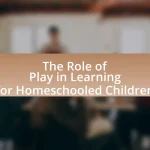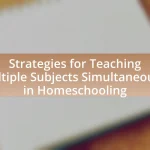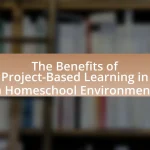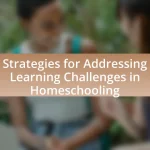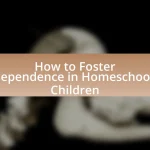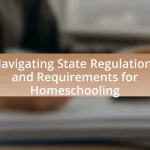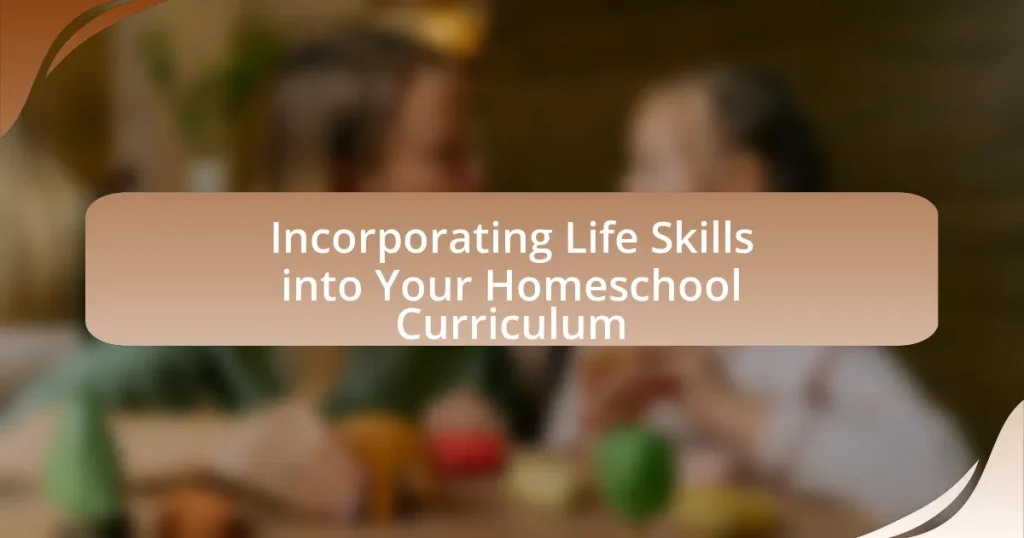The article focuses on the integration of life skills into homeschool curricula, emphasizing the importance of teaching practical abilities such as financial literacy, communication, problem-solving, and time management alongside traditional academic subjects. It highlights the benefits of life skills education, including enhanced independence, improved decision-making, and better social interactions, which contribute to a child’s overall development and future success. The article also discusses specific life skills to prioritize, methods for effective integration into existing subjects, and strategies for assessment and feedback, while addressing common misconceptions and challenges faced by homeschooling families. Additionally, it outlines the role of technology and community involvement in enhancing life skills education, ultimately underscoring the long-term advantages of incorporating these skills into a comprehensive educational framework.
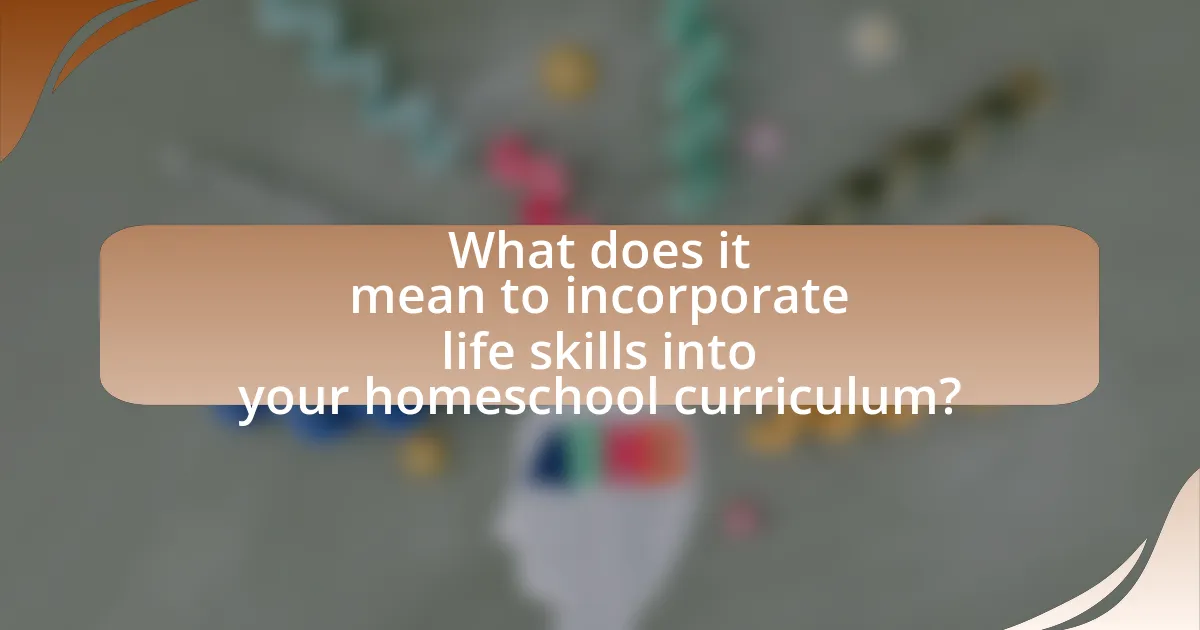
What does it mean to incorporate life skills into your homeschool curriculum?
Incorporating life skills into your homeschool curriculum means integrating practical abilities and knowledge that prepare students for everyday challenges and responsibilities. This approach emphasizes teaching skills such as financial literacy, communication, problem-solving, and time management alongside traditional academic subjects. Research indicates that students who learn life skills are better equipped to navigate real-world situations, enhancing their overall development and independence. For instance, a study by the National Association of State Boards of Education highlights that life skills education significantly improves students’ confidence and decision-making abilities, demonstrating the importance of this integration in a comprehensive educational framework.
Why are life skills important for homeschoolers?
Life skills are important for homeschoolers because they equip students with essential competencies needed for daily living and future success. These skills, such as communication, problem-solving, and time management, foster independence and self-sufficiency, which are crucial for navigating adult life. Research indicates that students who learn life skills alongside academic subjects tend to perform better in real-world situations, enhancing their overall educational experience and preparing them for challenges beyond the classroom.
What specific life skills should be prioritized in a homeschool setting?
In a homeschool setting, specific life skills that should be prioritized include financial literacy, effective communication, critical thinking, problem-solving, and time management. Financial literacy equips students with the knowledge to manage money, budget, and understand investments, which is essential for adult life. Effective communication skills enable students to express themselves clearly and interact positively with others, fostering personal and professional relationships. Critical thinking and problem-solving skills encourage students to analyze situations, make informed decisions, and tackle challenges creatively. Time management teaches students how to prioritize tasks and meet deadlines, which is crucial for academic success and future employment. These skills are foundational for independent living and career readiness, making them vital components of a comprehensive homeschool curriculum.
How do life skills contribute to a child’s overall development?
Life skills significantly contribute to a child’s overall development by enhancing their ability to navigate daily challenges and fostering independence. These skills, which include problem-solving, communication, and emotional regulation, equip children with the tools necessary for effective interaction in social settings and academic environments. Research indicates that children who develop strong life skills exhibit improved academic performance and better emotional well-being, as evidenced by a study published in the Journal of Educational Psychology, which found that students with higher life skills scores had a 20% increase in academic achievement. Thus, integrating life skills into a child’s education not only prepares them for immediate challenges but also lays a foundation for lifelong success.
How can life skills be integrated into existing subjects?
Life skills can be integrated into existing subjects by embedding practical applications and real-world scenarios within the curriculum. For instance, in mathematics, students can learn budgeting and financial literacy through projects that involve managing a household budget or planning a small business. In science classes, experiments can be designed to teach problem-solving and critical thinking by requiring students to hypothesize, test, and analyze results. Additionally, language arts can incorporate life skills by having students engage in persuasive writing or public speaking exercises that enhance communication abilities. Research indicates that integrating life skills into academic subjects not only improves student engagement but also enhances retention of knowledge, as demonstrated in studies like the one conducted by the Collaborative for Academic, Social, and Emotional Learning, which found that students who participated in integrated programs showed significant improvements in both academic performance and social skills.
What subjects lend themselves well to life skills integration?
Subjects that lend themselves well to life skills integration include mathematics, science, language arts, social studies, and health education. Mathematics teaches budgeting and financial literacy, while science fosters critical thinking and problem-solving skills. Language arts enhance communication and interpersonal skills, and social studies promote understanding of civic responsibility and cultural awareness. Health education emphasizes personal well-being and decision-making regarding health choices. These subjects provide practical applications that help students develop essential life skills necessary for everyday living.
How can project-based learning enhance life skills education?
Project-based learning enhances life skills education by providing students with hands-on experiences that foster critical thinking, collaboration, and problem-solving abilities. This approach engages learners in real-world projects, allowing them to apply theoretical knowledge in practical situations, which is essential for developing competencies such as communication, teamwork, and adaptability. Research indicates that students involved in project-based learning demonstrate improved engagement and retention of information, as evidenced by a study published in the “Journal of Educational Psychology,” which found that students in project-based environments scored higher on assessments of critical thinking and collaboration skills compared to those in traditional learning settings.
What challenges might arise when incorporating life skills?
Incorporating life skills into a homeschool curriculum may present challenges such as lack of resources, varying student engagement, and difficulty in assessment. The absence of structured programs or materials can hinder effective teaching, as parents may struggle to find appropriate resources that align with their educational goals. Additionally, students may show differing levels of interest and motivation, making it challenging to maintain a consistent learning environment. Furthermore, assessing the mastery of life skills can be complex, as traditional grading systems may not adequately reflect a student’s practical abilities or progress in real-world applications. These challenges highlight the need for careful planning and adaptation in the curriculum to effectively teach life skills.
How can parents overcome resistance to life skills education?
Parents can overcome resistance to life skills education by actively engaging their children in the learning process and demonstrating the practical benefits of these skills. By incorporating real-life scenarios and hands-on activities, parents can show how life skills apply to everyday situations, making the learning relevant and relatable. Research indicates that experiential learning enhances retention and interest; for instance, a study by the National Center for Education Statistics found that students who participate in hands-on learning experiences are more likely to retain information and apply it effectively. Additionally, parents can foster a positive attitude towards life skills education by celebrating small achievements and encouraging open discussions about the importance of these skills in achieving independence and success.
What resources are available to support life skills integration?
Resources available to support life skills integration include educational programs, online courses, community workshops, and curriculum guides specifically designed for homeschooling. For instance, organizations like the National Center for Learning Disabilities provide resources that focus on practical life skills, while platforms such as Khan Academy offer courses that integrate life skills into their educational content. Additionally, local community centers often host workshops that teach essential skills like cooking, budgeting, and time management, which are crucial for life skills development. These resources collectively enhance the homeschooling experience by providing structured opportunities for students to learn and apply life skills in real-world contexts.
How can assessment be conducted for life skills learning?
Assessment for life skills learning can be conducted through a combination of practical evaluations, self-assessments, and observational assessments. Practical evaluations involve students demonstrating their skills in real-life scenarios, such as cooking or budgeting, which allows educators to assess their ability to apply learned skills effectively. Self-assessments enable learners to reflect on their own progress and identify areas for improvement, fostering self-awareness and personal growth. Observational assessments involve educators monitoring students during activities to evaluate their problem-solving, communication, and interpersonal skills in action. Research indicates that these varied assessment methods provide a comprehensive understanding of a student’s life skills proficiency, as they encompass both theoretical knowledge and practical application.
What methods can be used to evaluate life skills development?
Methods to evaluate life skills development include observational assessments, self-assessments, peer assessments, and performance-based evaluations. Observational assessments involve monitoring students in real-life situations to gauge their application of life skills, such as communication and problem-solving. Self-assessments allow learners to reflect on their own skills and identify areas for improvement, fostering self-awareness. Peer assessments encourage collaboration and feedback among students, enhancing their understanding of life skills through shared experiences. Performance-based evaluations require students to demonstrate specific skills in practical scenarios, providing tangible evidence of their abilities. These methods are effective as they encompass a comprehensive approach to assessing various dimensions of life skills development.
How can feedback be effectively provided to students?
Feedback can be effectively provided to students through timely, specific, and constructive comments that guide their learning process. Timely feedback ensures that students can immediately apply the insights to their work, while specificity helps them understand exactly what they did well and what needs improvement. Constructive feedback focuses on the task rather than the individual, promoting a growth mindset. Research indicates that feedback that is clear and actionable can lead to improved student performance, as evidenced by a study published in the “Review of Educational Research” which found that effective feedback can enhance learning outcomes by up to 30%.
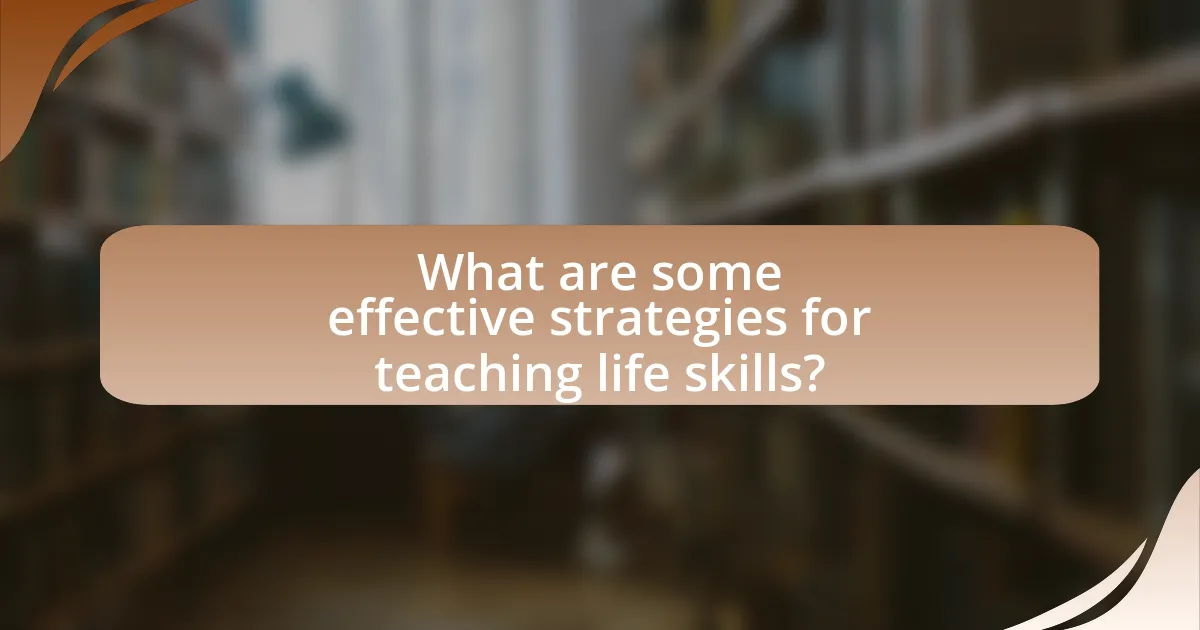
What are some effective strategies for teaching life skills?
Effective strategies for teaching life skills include experiential learning, role-playing, and project-based activities. Experiential learning allows students to engage in real-life situations, enhancing their understanding and retention of skills. Role-playing provides a safe environment for practicing social interactions and decision-making. Project-based activities encourage critical thinking and problem-solving by requiring students to plan, execute, and reflect on their projects. Research indicates that hands-on approaches significantly improve skill acquisition and application, making these strategies particularly effective in a homeschool curriculum focused on life skills.
How can real-life experiences be utilized in teaching life skills?
Real-life experiences can be utilized in teaching life skills by integrating practical activities that reflect everyday situations. For instance, engaging students in cooking, budgeting, or community service allows them to apply theoretical knowledge in real contexts, enhancing their understanding and retention of essential skills. Research indicates that experiential learning, as outlined by Kolb’s Experiential Learning Theory, significantly improves skill acquisition and personal development. This approach not only fosters critical thinking and problem-solving abilities but also prepares students for real-world challenges by providing them with hands-on experience.
What types of community involvement can enhance life skills learning?
Community involvement that enhances life skills learning includes volunteering, participating in local organizations, and engaging in community service projects. Volunteering provides hands-on experience in teamwork, communication, and problem-solving, which are essential life skills. For instance, a study by the Corporation for National and Community Service found that individuals who volunteer regularly develop stronger interpersonal skills and a greater sense of responsibility. Additionally, participating in local organizations, such as youth clubs or sports teams, fosters leadership and collaboration skills. Engaging in community service projects allows individuals to apply critical thinking and adaptability in real-world situations, further reinforcing their life skills.
How can parents model life skills in everyday situations?
Parents can model life skills in everyday situations by demonstrating practical tasks and decision-making processes during daily routines. For instance, when preparing a meal, parents can involve children in planning, shopping, and cooking, thereby teaching skills such as budgeting, nutrition, and time management. Research indicates that experiential learning, where children actively participate in real-life activities, enhances their understanding and retention of life skills (Kolb, 1984). By consistently integrating these activities into their daily lives, parents provide children with opportunities to observe and practice essential skills, reinforcing their importance in a practical context.
What role does technology play in teaching life skills?
Technology plays a crucial role in teaching life skills by providing interactive and engaging platforms for learning. Digital tools such as educational apps, online courses, and virtual simulations enable learners to practice real-world scenarios, enhancing their problem-solving and critical-thinking abilities. For instance, a study by the International Society for Technology in Education found that students using technology for skill development showed a 30% improvement in their ability to apply life skills in practical situations. This integration of technology not only makes learning more accessible but also prepares students for the demands of modern life.
How can online resources and apps support life skills education?
Online resources and apps can significantly enhance life skills education by providing interactive and accessible learning experiences. These digital tools offer a variety of modules and activities that teach essential skills such as financial literacy, communication, and problem-solving. For instance, apps like Mint help users manage budgets and track expenses, directly supporting financial literacy education. Additionally, platforms like Khan Academy provide courses on critical thinking and decision-making, which are vital life skills. Research indicates that interactive learning environments improve retention and engagement, making online resources effective in teaching life skills.
What are the benefits of using virtual simulations for life skills training?
Virtual simulations for life skills training provide immersive, interactive environments that enhance learning and retention. These simulations allow learners to practice real-world scenarios in a safe setting, which can lead to improved decision-making and problem-solving skills. Research indicates that experiential learning through simulations can increase engagement and motivation, as students actively participate rather than passively absorb information. Additionally, studies show that virtual simulations can cater to diverse learning styles, making them effective for a wide range of learners. For instance, a study published in the Journal of Educational Psychology found that students who engaged in simulation-based learning scored significantly higher on assessments compared to those who received traditional instruction.
How can collaboration with other families enhance life skills education?
Collaboration with other families enhances life skills education by providing diverse perspectives and shared resources. When families work together, they can create a richer learning environment that incorporates various life skills such as teamwork, communication, and problem-solving. For instance, joint activities like community service projects or group workshops allow children to practice these skills in real-world contexts. Research indicates that collaborative learning environments improve social skills and increase engagement, as evidenced by a study published in the Journal of Educational Psychology, which found that students in collaborative settings demonstrated higher levels of motivation and achievement.
What are the benefits of co-op programs focused on life skills?
Co-op programs focused on life skills provide students with practical experiences that enhance their personal development and employability. These programs facilitate hands-on learning, allowing participants to apply theoretical knowledge in real-world situations, which fosters critical thinking and problem-solving abilities. Research indicates that students engaged in co-op programs often demonstrate improved communication skills and greater self-confidence, as they interact with diverse groups and navigate various challenges. Additionally, co-op programs can lead to networking opportunities and potential job placements, as students build connections within their communities and industries.
How can families share resources and strategies for teaching life skills?
Families can share resources and strategies for teaching life skills by collaborating on educational activities and exchanging materials. For instance, families can create a shared online platform or group where they post lesson plans, worksheets, and videos focused on life skills such as budgeting, cooking, and time management. Research indicates that collaborative learning enhances skill acquisition; a study by Johnson and Johnson (1999) found that cooperative learning leads to higher achievement and greater retention of knowledge. Additionally, families can organize workshops or community events where they demonstrate life skills, allowing participants to learn from each other in a hands-on environment. This approach not only fosters a sense of community but also provides diverse perspectives on teaching methods.
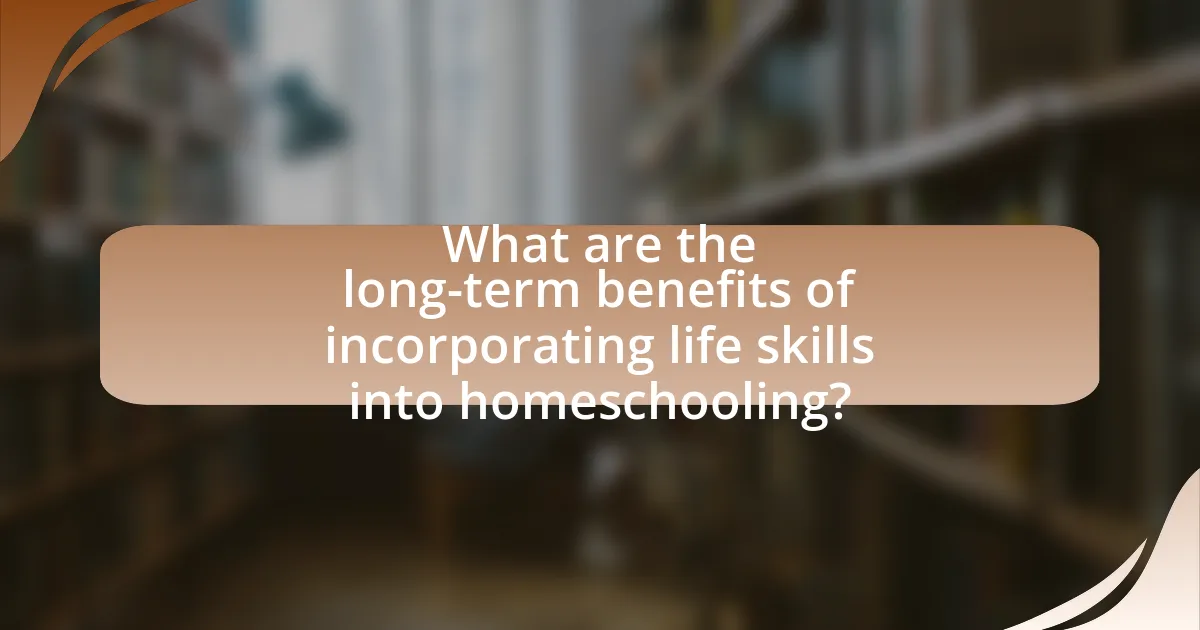
What are the long-term benefits of incorporating life skills into homeschooling?
Incorporating life skills into homeschooling provides long-term benefits such as enhanced independence, improved problem-solving abilities, and better social interactions. These skills prepare students for real-world challenges, fostering self-sufficiency and adaptability. Research indicates that individuals who learn life skills early on are more likely to succeed in personal and professional environments, as they can navigate complex situations effectively. For instance, a study by the National Center for Education Statistics found that students who engage in practical life skills training demonstrate higher levels of confidence and resilience in adulthood.
How do life skills impact future educational and career opportunities?
Life skills significantly enhance future educational and career opportunities by equipping individuals with essential competencies such as problem-solving, communication, and time management. These skills foster adaptability and resilience, which are critical in both academic settings and the workplace. Research indicates that students who possess strong life skills are more likely to achieve higher academic performance and secure better job placements. For instance, a study published in the Journal of Educational Psychology found that students with developed life skills demonstrated a 20% increase in academic success compared to their peers lacking these skills. This correlation underscores the importance of integrating life skills into educational curricula to prepare students for future challenges.
What evidence supports the effectiveness of life skills education?
Life skills education is effective in enhancing students’ social, emotional, and cognitive competencies, as evidenced by various studies. For instance, a meta-analysis conducted by Durlak et al. (2011) found that programs focusing on social-emotional learning, which is a key component of life skills education, resulted in an 11 percentile-point gain in academic achievement compared to control groups. Additionally, the World Health Organization reported that life skills education can significantly reduce risky behaviors and improve mental health outcomes among youth. These findings demonstrate that life skills education not only fosters personal development but also contributes to academic success and overall well-being.
How can life skills contribute to personal independence and confidence?
Life skills significantly enhance personal independence and confidence by equipping individuals with the necessary tools to navigate daily challenges effectively. Mastery of skills such as time management, financial literacy, and effective communication fosters self-reliance, enabling individuals to make informed decisions and solve problems independently. Research indicates that individuals who possess strong life skills report higher levels of self-esteem and are more likely to pursue personal and professional goals, as evidenced by a study published in the Journal of Applied Psychology, which found that life skills training improved self-efficacy among participants. This correlation underscores the importance of integrating life skills into educational frameworks, particularly in homeschooling, to promote autonomy and bolster confidence in learners.
What are some common misconceptions about life skills education?
Common misconceptions about life skills education include the belief that it is only about practical tasks, such as cooking or budgeting, and that it is not as important as academic subjects. In reality, life skills education encompasses a broad range of competencies, including emotional intelligence, critical thinking, and interpersonal skills, which are essential for personal and professional success. Research indicates that students who receive life skills education demonstrate improved social interactions and better decision-making abilities, highlighting its significance alongside traditional academic learning.
How can parents address myths surrounding life skills in homeschooling?
Parents can address myths surrounding life skills in homeschooling by actively educating themselves and others about the comprehensive nature of life skills education. Research indicates that homeschooling can effectively incorporate practical skills such as financial literacy, cooking, and time management, which are essential for real-world success. For instance, a study by the National Center for Education Statistics shows that homeschooled students often outperform their peers in standardized tests, suggesting that a well-rounded curriculum can be achieved at home. By sharing these findings and implementing structured life skills lessons, parents can dispel misconceptions and demonstrate the effectiveness of their homeschooling approach.
What is the difference between academic skills and life skills?
Academic skills refer to the abilities required to succeed in educational settings, such as reading, writing, mathematics, and critical thinking. In contrast, life skills encompass a broader range of competencies necessary for daily living and personal development, including communication, problem-solving, financial literacy, and emotional intelligence. Academic skills are often assessed through formal education systems, while life skills are typically learned through real-world experiences and interactions. The distinction is significant as academic skills focus on knowledge acquisition and intellectual development, whereas life skills emphasize practical application and adaptability in everyday situations.
What practical tips can help parents successfully incorporate life skills?
To successfully incorporate life skills, parents should engage children in real-life activities that promote practical learning. For example, involving children in cooking teaches them about nutrition, measurements, and time management. Additionally, parents can assign age-appropriate chores, which instills responsibility and organizational skills. Research indicates that experiential learning, such as volunteering or managing a small budget, enhances critical thinking and problem-solving abilities. By integrating these activities into daily routines, parents can effectively teach essential life skills that children will use throughout their lives.
How can parents create a balanced curriculum that includes life skills?
Parents can create a balanced curriculum that includes life skills by integrating practical experiences alongside academic subjects. This can be achieved by incorporating activities such as cooking, budgeting, and time management into the daily learning schedule. Research indicates that experiential learning enhances retention and application of skills; for instance, a study by the National Center for Education Statistics found that students who engage in hands-on activities demonstrate improved problem-solving abilities. By blending traditional subjects with life skills, parents can ensure a well-rounded education that prepares children for real-world challenges.
What are some best practices for teaching life skills effectively?
Best practices for teaching life skills effectively include hands-on learning, real-life applications, and consistent practice. Engaging students in practical activities, such as cooking or budgeting, allows them to apply theoretical knowledge in real-world scenarios. Research indicates that experiential learning enhances retention and understanding, as demonstrated by a study published in the Journal of Educational Psychology, which found that students who participated in hands-on activities scored significantly higher on assessments related to life skills. Additionally, incorporating discussions about the importance of these skills in everyday life reinforces their relevance and encourages students to practice them regularly.

